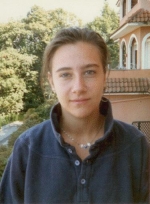by Giulia Paola di Nicola
Most people in Italy saw at least part of the televised transmission of the beatification of Chiara Badano (1971-1990), known as Chiara Luce, who died at the age of nineteen of bone cancer. The ceremony was presided by Archbishop Angelo Amato, Prefect of the Congregation for the Causes of Saints, on 25 September 2010 at the "Divino Amore" Sanctuary. The beatification was a great collective celebration as perhaps only the Focolari know how to organise. They have so often arranged gatherings of young people, families and priests with the Pope. There were several innovations in the beatification ceremony:
There was a programme leading up to the liturgical celebration that included testimonies and contributions by young people;
There was a programme in the Paul VI Hall one evening that was organised for young people by young people. It helped them to get to know Chiara Luce, and to learn, with her and like her, how to progress on the journey to holiness.
It is worthwhile looking at some of the aspects of Chiara Luce that are emphasised by the Church:
Chiara Badano, a girl of strong clear faith, is the first member of the Focolari Movement to be declared blessed. Maybe the Focolarini would have expected, understandably, if one of their heads such as Igino Giordani or Chiara Lubich herself had gone first, but the ways of the Church have their own logic and things do not always happen in the expected order. Amazement and wonder are the sentiments at these times.
There has always been fascination at the power that lies in innocence. The holiness of this girl shows how the little ones are open to God's unconditional love. Their souls have not yet been contaminated by the dust of the world, making it so much easier for the Church to recognise holiness. Adults take on responsibilities that inevitably involve making decisions that do not please everyone, and they make statements that some people find normal and others regard as ill-advised...
Chiara's family life is an essential aspect to understanding the milieu in which she lived. The same is true of the Beltrame Quattrocchi couple who were beatified. Maria Corsini wrote in relation to her children: "Mothers might wonder what the secret might be to the fostering of these divine calls. Might it be an environment of concentrated piety, or a life of self-denial, penance, sacrifice and duress? Does it need little altars and non-stop prayer? I do not know, but all of this certainly was not the reason for my children's vocations because none of this ever existed. We wanted their souls to remain fresh and pure and protected from evil; to breathe Christian life and be nourished daily by the divine Eucharist; to meditate briefly each day and not be exasperated by oppressive excess; to rejoice in the gift of life, the beauty of nature as they go out and climb up in safe company in accordance with our principles; to love their country and its institutions with loyalty and enthusiasm, and the duties that this entails; to know their religion from top to bottom and to serve it with coherence. That is all".
In Chiara Badano's story, we see that the spirituality of love at any cost encompasses the whole family and close friends who sustained her, prayed for her, came to visit her and did everything possible not to leave the girl and her family without support. We see in Chiara's story that there was a deep and unique understanding between her and her mother. It can be seen in letters, incidents and conversations that were brought to the beatification process that their mutual understanding was the cornerstone of the faith that united the community. Chiara suffered and asked for help, as we all do with our mothers, but she also knew how to console her, encourage her and bring her happiness.
Their story confirms God's design for motherhood which joins, in a unique way, physically and spiritually, two reciprocally responsive creatures. On 7 October 1990, Chiara said goodbye to her mother with the words: "be happy! I am".
There is beauty in the paradox of happiness in suffering and at the moment of death. We remember how Therese of Lisieux, with her mouth filled with blood, said: "Ecce, sponsus Venit".






